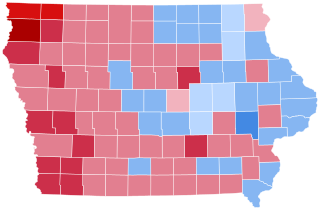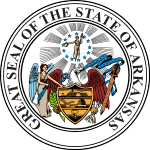
Blanche Lambert Lincoln is an American politician who served as a United States Senator from Arkansas from 1999 to 2011. A member of the Democratic Party, she was first elected to the Senate in 1998; she was the first woman elected to the Senate from Arkansas since Hattie Caraway in 1932 and youngest woman ever elected to the Senate at age 38. She previously served in the U.S. House of Representatives, representing Arkansas's 1st congressional district from 1993 to 1997.

The 2004 United States Senate elections were held on November 2, 2004, with all Class 3 Senate seats being contested. They coincided with the re-election of George W. Bush as president and the United States House elections, as well as many state and local elections. Senators who were elected in 1998, known as Senate Class 3, were seeking re-election or retiring in 2004.
The Democratic Senatorial Campaign Committee (DSCC) is the Democratic Hill committee for the United States Senate. It is the only organization solely dedicated to electing Democrats to the United States Senate. The DSCC's current Chair is Senator Gary Peters of Michigan, who succeeded Nevada's Catherine Cortez Masto after the 2020 Senate elections. DSCC's current executive director is Christie Roberts.
Southern Democrats are members of the U.S. Democratic Party who reside in the Southern United States.

The 1998 United States Senate elections were held on November 3, with the 34 seats of Class 3 contested in regular elections. This was seen as an even contest between the Republican Party and Democratic Party. While the Democrats had to defend more seats up for election, Republican attacks on the morality of President Bill Clinton failed to connect with voters and anticipated Republican gains did not materialize. The Republicans picked up open seats in Ohio and Kentucky and narrowly defeated Democratic incumbent Carol Moseley Braun, but these were cancelled out by the Democrats' gain of an open seat in Indiana and defeats of Republican Senators Al D'Amato and Lauch Faircloth. The balance of the Senate remained unchanged at 55–45 in favor of the Republicans.

The 1996 United States Senate elections were held on November 5, with the 33 seats of Class 2 contested in regular elections. Special elections were also held to fill vacancies. They coincided with the presidential election of the same year, in which Democrat Bill Clinton was re-elected president.

The 1992 United States Senate elections, held November 3, 1992, were elections for the United States Senate. The 34 seats of Class 3 were contested in regular elections, along with special elections to fill vacancies. They coincided with Bill Clinton's victory in the presidential election. This was the first time since 1956 that the balance of the Senate remained the same.

The 2004 United States presidential election in Iowa took place on November 2, 2004, as part of the 2004 United States presidential election in which all 50 states plus the District of Columbia participated. Voters chose seven electors to represent them in the Electoral College via a popular vote pitting incumbent Republican President George W. Bush and his running mate, Vice President Dick Cheney, against Democratic challenger and Senator from Massachusetts John F. Kerry and his running mate, Senator from North Carolina John Edwards. Six third parties were also on the ballot.

The 2004 United States presidential election in Arkansas took place on November 2, 2004, and was part of the 2004 United States presidential election. State voters chose six representatives, or electors to the Electoral College, who voted for president and vice president.

The 2004 United States presidential election in Indiana took place on November 2, 2004, and was part of the 2004 United States presidential election. Voters chose 11 representatives, or electors to the Electoral College, who voted for president and vice president.

The 2010 United States Senate election in Arkansas took place on November 2, 2010 alongside other elections to the United States Senate in other states, as well as elections to the United States House of Representatives and various state and local elections.

The 2008 United States presidential election in Oklahoma took place on November 4, 2008, and was part of the 2008 United States presidential election. Voters chose seven representatives, or electors to the Electoral College, who voted for president and vice president.

The 2008 United States presidential election in North Carolina was part of the national event on November 4, 2008, throughout all 50 states and D.C. In North Carolina, voters chose 15 representatives, or electors, to the Electoral College, who voted for president and vice president.

The 2008 United States presidential election in Arkansas took place on November 4, 2008, and was part of the 2008 United States presidential election. State voters chose six representatives, or electors to the Electoral College, who voted for president and vice president.

The 1996 United States elections were held on November 5. Democratic President Bill Clinton won re-election, while the Republicans maintained their majorities in both houses of the United States Congress.

Arkansas's 2010 general elections were held November 2, 2010. Primaries were held May 18, 2010 and runoffs, if necessary, were held November 23, 2010. Arkansas elected seven constitutional officers, 17 of 35 state senate seats, all 100 house seats and 28 district prosecuting attorneys, and voted on one constitutional amendment and one referred question. Non-partisan judicial elections were held the same day as the party primaries for four Supreme Court justices, four appeals circuit court judges, and eight district court judges.

The 1992 United States elections elected state governors, the President of the United States, and members of the 103rd United States Congress. The election took place after the Soviet Union crumbled and the Cold War ended, as well as the redistricting that resulted from the 1990 census. Often considered "The Year Of The Woman," these elections brought an increased number of female politicians to Washington such as Dianne Feinstein (D-CA) and Carol Moseley Braun (D-IL). Governor Bill Clinton of Arkansas defeated incumbent President George H. W. Bush and businessman Ross Perot in the presidential election. The Democratic Party maintained their control of both chambers of Congress. This is the first Democratic trifecta since the Republican victory in the 1980 elections and the last one during the 20th century and the last one overall until 2008.

The 2014 United States Senate election in Arkansas was held on November 4, 2014, to elect a member of the United States Senate to represent the state of Arkansas, concurrently with the election of the Governor of Arkansas, as well as other elections to the United States Senate in other states and elections to the United States House of Representatives and various state and local elections.

The 2016 United States elections were held on Tuesday, November 8, 2016. Republican nominee Donald Trump defeated Democratic former Secretary of State Hillary Clinton in the presidential election, while Republicans retained control of Congress. This marked the first and most recent time Republicans won or held unified control of the presidency and Congress since 2004.

The 2022 United States Senate election in Arkansas was held on November 8, 2022, to elect a member to the United States Senate to represent the state of Arkansas. Incumbent senator John Boozman was first elected in 2010, defeating Democratic incumbent Blanche Lincoln. Boozman was re-elected for a second term in the 2016 with 59.8% of the vote and ran in 2022 for a third term. Boozman won the May 24, 2022 Republican primary with 58.03% of the vote and subsequently defeated Democrat Natalie James in the general election by 34.64 percentage points. This was the best performance for a Republican senator in the state's history, and the third consecutive Republican win of this seat.





















